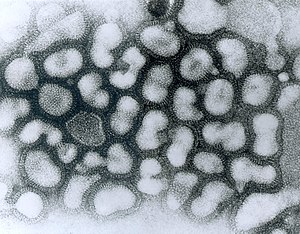 Image via Wikipedia
Image via Wikipedia06/22/2009 | 07:13 PM
MANILA, Philippines — Malacañang on Monday appealed for calm after the Health department reported the Philippine’s first Influenza A(H1N1)-related fatality.
“This should not cause alarm or panic since the patient died of heart attack and 84 per cent of all reported cases of the A(H1N1) have fully recovered," Deputy Presidential Spokesperson Lorelei Fajardo said in a text message to reporters.
Fajardo, however, reminded the public to remain vigilant against the new strain and follow the health advisories of the Department of Health even if the virus is mild in form.
The DOH said that a 49-year-old Filipino woman infected with Influenza A(H1N1) has died , the first fatality related to the new flu strain in the Philippines and Asia.
State powers
Meanwhile, National Center for Disease Prevention and Control head Yolanda Oliveros said the government is ready to use "state powers" to deal with possible riots over the A(H1N1) scare as part of its contingency plan.
Oliveros said the contingency plan, which included a simulation plan for pandemics, was formulated as early as the third quarter of 2008.
She said the plan includes a communication strategy to prevent panic.
Last April, Health Secretary Francisco Duque III said they are not discounting the possibility of using "state powers" such as tapping the military and the police to quell possible riots that a possible swine flu pandemic might create.
Health officials had set a national command conference Thursday to discuss emergency measures amid looming swine flu pandemic.
"Our recommendation in case of a pandemic – and we pray this will not happen – is to use state powers, including the military and police, to quell lawlessness. That is a last resort and I am hopeful it will never come)," he had said in a radio interview.
Public vigilance
At the Senate, Senator Pilar Juliana Cayetano on Monday called for public vigilance and calm in dealing with the spread of the influenza A(H1N1) virus amid the first reported death in the Philippines.
"We must not be complacent. As previously warned, those with pre-existing conditions are vulnerable. So we should continue to be vigilant," Cayetano said in a press statement.
At the same time, Cayetano warned the public against deceiving claims of certain health supplement manufacturers and distributors that consuming their products would increase body resistance to the virus.
Cayetano, chairman of the Senate Committee on Social Justice, supported an earlier order by the DOH instructing the Bureau of Food and Drugs (BFAD) to probe possible misinformation by companies that advertise their health supplements supposedly as vaccines or cures to A(H1N1).
"It’s the height of irresponsibility for manufacturers to claim or to even suggest that consuming their products would increase resistance to the virus. They add to disinformation and even profit from it," the senator said.
She said while the vaccine is still being developed, the best means of defense against A(H1N1) are still good health, right information and taking necessary precautions.
With this, Cayetano called for the immediate enactment of the “Food and Drug Administration (FDA) Act of 2009" which seeks to strengthen the BFAD by reconstituting it into the FDA.
The measure was ratified by both chambers before Congress went on break earlier this month and is now awaiting the signature of the President to become a law.
Cayetano, one of the bill’s principal authors, said FDA would have expanded authority compared to the BFAD for the effective monitoring of health products and ensuring their compliance to safety standards.
She said the agency would have primary jurisdiction not only over dietary supplements, but also food, medicines, cosmetics and medical devices.
“Under the proposed bill, the FDA will have the authority to conduct spot checks on establishments for compliance and issue cease-and-desist orders for health products found to pose a threat to public health. The agency can also order the ban or recall from the market of any health product that is found to be unsafe or grossly deceptive, such as those that make false therapeutic claims," Cayetano said.- GMANews.TV
From GMANews.tv; see the source article here.










No comments:
Post a Comment